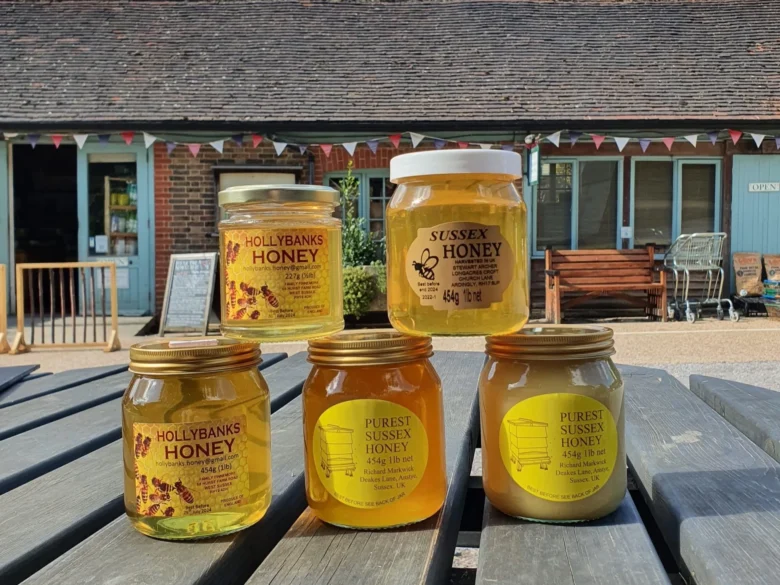Honey is more than just a sweet treat. It’s a natural remedy with powerful health benefits, from boosting your immune system to soothing sore throats and supporting digestion. However, not all honey is created equal. The type, quality, and processing methods can all impact its health benefits. To make the most of honey’s medicinal properties, it’s essential to choose the right one.
In this guide, we’ll break down how to choose the best honey for maximum health benefits, the different types of honey available, and tips for identifying high-quality honey.
1. Why Honey is Good for Your Health
Before we dive into the specifics of choosing the best honey, it’s important to understand why honey is beneficial for your health:
- Antioxidants: Honey is rich in antioxidants that help fight free radicals, reduce inflammation, and protect cells from damage.
- Antibacterial and Antifungal Properties: Honey has been used for centuries to treat infections due to its natural antibacterial and antifungal properties.
- Soothing and Healing: Honey is a natural remedy for sore throats, coughs, and wounds. Its soothing effect provides immediate relief, while its healing properties promote faster recovery.
- Energy Boost: The natural sugars in honey (fructose and glucose) are quickly absorbed into the bloodstream, providing a quick energy boost.
- Digestive Health: Honey, especially raw honey, promotes healthy digestion by stimulating the production of beneficial gut bacteria and enzymes.
2. Types of Honey and Their Health Benefits
The variety of honey you choose can significantly affect its health benefits. Here’s a breakdown of the most popular types of honey and what makes each one special:
1. Raw Honey
Raw honey is honey in its purest form, extracted directly from the honeycomb and minimally processed. It has the highest concentration of enzymes, antioxidants, and nutrients because it hasn’t been heated or filtered.
- Health Benefits: Raw honey is packed with antioxidants, enzymes, and bacteria-fighting properties. It is great for soothing sore throats, improving digestion, and boosting the immune system.
- Best for: People looking for the highest health benefits, including immunity support, digestive health, and wound healing.
Tip: Always check the label to ensure the honey is labeled “raw”. Raw honey will often appear cloudy or opaque due to the presence of beneficial particles like pollen and bee propolis.
2. Manuka Honey
Manuka honey is one of the most prized types of honey, produced by bees that pollinate the Manuka bush (Leptospermum scoparium) in New Zealand and Australia. It has garnered attention for its unique antibacterial properties, which are due to the presence of methylglyoxal (MGO).
- Health Benefits: Manuka honey is known for its exceptionally strong antibacterial and antifungal properties, making it particularly effective for treating infections, soothing digestive issues, and healing wounds.
- Best for: Those with digestive disorders, skin conditions, and wound healing. It’s also excellent for soothing sore throats and treating gastrointestinal problems like ulcers and IBS.
Tip: Look for Manuka honey with a UMF (Unique Manuka Factor) rating. The higher the UMF, the stronger the antibacterial properties. For health purposes, opt for honey with a UMF rating of at least 10+.
3. Buckwheat Honey
Buckwheat honey comes from bees that collect nectar from buckwheat flowers. It’s typically darker in color and has a more robust flavor compared to lighter honeys.
- Health Benefits: Buckwheat honey is rich in antioxidants, including phenolic compounds, which help fight oxidative stress. It’s also known for its anti-inflammatory and antibacterial properties.
- Best for: People looking for immune support and cough relief. Buckwheat honey is also a great option for athletes needing a natural energy boost.
Tip: If you need a honey with a more substantial taste and higher antioxidant content, buckwheat honey is a great choice.
4. Acacia Honey
Acacia honey is sourced from the blossoms of the acacia tree and is typically lighter in color, ranging from pale yellow to almost clear.
- Health Benefits: Acacia honey is known for its high fructose content, which makes it easier to digest than other types of honey. It is also a gentle detoxifier for the liver and digestive system.
- Best for: Those with sensitive stomachs, liver detoxification, and digestive support. It’s also a good option for people who want a milder flavor with all the benefits of honey.
Tip: Acacia honey is high in fructose, making it a great option for energy and blood sugar regulation. It’s also ideal for people with sensitive digestive systems.
5. Wildflower Honey
Wildflower honey is produced by bees that collect nectar from a variety of wildflowers. It is often considered a multi-floral honey, as the exact types of flowers vary depending on the region and season.
- Health Benefits: Wildflower honey is a rich source of antioxidants, and its blend of different flowers provides a mix of nutrients. It also has mild antibacterial properties and can help soothe the throat and promote digestive health.
- Best for: People seeking a mildly sweet honey with general health benefits. It’s also suitable for those who want a versatile honey that can be used for both food and health purposes.
Tip: Wildflower honey is more affordable than premium varieties like Manuka and raw honey, but still offers great general health benefits.
3. How to Identify the Best Honey for Maximum Health Benefits
Not all honey is made equal, and several factors can determine whether it’s high quality and beneficial. Here are some tips to help you choose the best honey:
1. Look for Raw or Unpasteurized Honey
Honey that has been pasteurized (heated) loses much of its beneficial enzymes, antioxidants, and other nutrients. Always look for honey that is labeled “raw” or “unpasteurized” to ensure you’re getting the full health benefits.
2. Check for Certification or Authenticity Labels
For premium varieties like Manuka honey, make sure to look for an official certification like UMF (Unique Manuka Factor) or MGO to guarantee its authenticity and potency.
3. Choose Organic Honey
Organic honey is produced without the use of harmful pesticides or chemicals, ensuring that the honey you’re consuming is free from contaminants. Look for honey that is labeled “certified organic” if you want to avoid exposure to these harmful substances.
4. Consider Local Honey for Allergy Relief
Local honey, especially from your region, is known for potentially helping with seasonal allergies. By consuming local honey, you’re exposing your body to small amounts of local pollen, which may help you build up a tolerance to allergens over time.
4. How to Use Honey for Maximum Health Benefits
- For Cough and Sore Throat Relief: Take 1-2 teaspoons of honey directly or mix it with warm water, herbal tea, or lemon juice.
- For Skin Health: Apply raw honey as a face mask to benefit from its antibacterial and moisturizing properties.
- For Digestive Health: Consume a tablespoon of raw honey on an empty stomach or add it to warm water in the morning to promote digestion.
- For Sleep: Honey has a calming effect, so taking a spoonful before bed can help improve sleep quality by promoting the release of melatonin.
Conclusion
Choosing the best honey for maximum health benefits depends on your specific needs and preferences. Raw honey is always a solid choice for general health, but specific varieties like Manuka honey, buckwheat honey, and acacia honey offer additional targeted benefits for immune support, energy, and skin health. Look for high-quality, organic, or certified honey for the most therapeutic effects.
By understanding the different types of honey and their unique properties, you can make a more informed decision and enjoy the full range of health benefits that this natural elixir has to offer.




